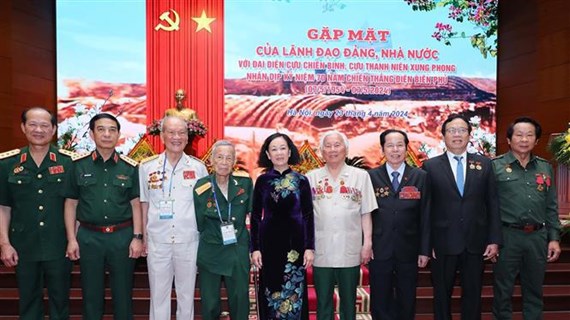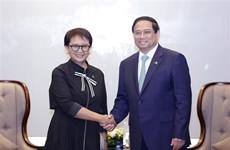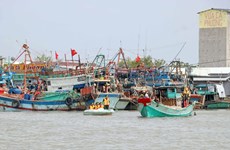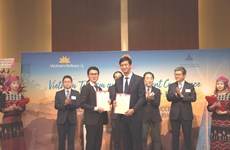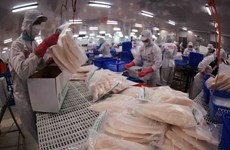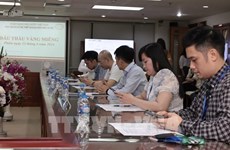Business-State link needed in light of TPP: radio
The State and the business community should work closely to raise the
competiveness of Vietnamese goods in the international market, in light
of the imminent TPP. Report by radio The Voice of Vietnam (VOV).
The State and the business community should work closely to raise the
competiveness of Vietnamese goods in the international market, in light
of the imminent TPP. Report by radio The Voice of Vietnam (VOV).
The Trans-Pacific Partnership (TPP) Agreement, currently in the final stages of negotiations, is expected to create both opportunities and challenges for Vietnam. The 12 member nations’ market accounts for over 40 percent of the global GDP and 30 percent of global trade.
Many economists predict that the TPP may be signed this year, and say that businesses should actively equip themselves with knowledge and necessary capacity to achieve good results in this expanded playground.
Dr Nguyen Duc Kien, Vice Chairman of the National Assembly Committee for Economic Affairs, said that Vietnam’s participation in the TPP will open up a huge market for businesses to sell products with differing requirements.
However, to join the playground, businesses need to do their due diligence and improve their knowledge of the international market place.
Kien said that many Vietnamese only see the advantages in joining the international integration process, but realities show that there are a number of significant challenges.
For example, the Vietnamese garment and textile businesses will witness spectacular growth in the US market when joining the Free Trade Agreement. However, the seafood industry has encountered impediments in the US market and consecutive anti-dumping lawsuits.
Kien also said that a requirement of joining the TPP is that businesses should accept the fact that they have to open up the door for commodities from other nations to enter the Vietnamese market – for which they may not be able to compete.
Therefore, the State and business community should closely cooperate in devising policies to help Vietnamese products compete in the international market at the reasonable prices.
Another challenge which Vietnam has to face is that the country may have to import cattle feed from other nations, which will sharply increase input costs, leading to a decrease in profits and competitiveness.
Foreign investment in Vietnam to increase
Minister of Planning and Investment Bui Quang Vinh said the TPP offers Vietnam, with its young and hardworking population, an excellent opportunity to both penetrate huge overseas markets and attract foreign investment, noting that it also poses a number of significant challenges to the country.
“If Vietnam can rise to the occasion and seize the opportunities the TPP presents, it can vastly expand its export markets, and quite possibly enjoy a preferential import waiver of tariffs in the demanding Japanese market,” Vinh said.
Through various TPP mechanisms, the Vietnamese market will open up to other member nation, which has the potential to result in an expansion of foreign investment inflow into the country.
One of the dilemmas the TPP presents to Vietnam relates to the garment and textile sector as currently the country imports 70-80 percent of input materials from China.
One of the conditions of the TPP, however, is that Vietnam has to use input materials from other TPP member nations and if it fails to comply with this strict requirement, Vietnamese textiles cannot be exported to other TPP member nations and enjoy preferential treatment.
One of the practical solutions to this problem is for Vietnam to attract big foreign investors to construct factories and manufacture the input materials for the textile industry right in the country, which will provide an economic boost to the economy.
Additionally, Vietnam can increase the value added to the textile industry products by doing the fashionable designs in country, he concluded.
Therefore, as a consequence of joining the TPP, Vietnam will simultaneously see greater opportunities to both export its products and to attract more foreign investment.-VNA
The Trans-Pacific Partnership (TPP) Agreement, currently in the final stages of negotiations, is expected to create both opportunities and challenges for Vietnam. The 12 member nations’ market accounts for over 40 percent of the global GDP and 30 percent of global trade.
Many economists predict that the TPP may be signed this year, and say that businesses should actively equip themselves with knowledge and necessary capacity to achieve good results in this expanded playground.
Dr Nguyen Duc Kien, Vice Chairman of the National Assembly Committee for Economic Affairs, said that Vietnam’s participation in the TPP will open up a huge market for businesses to sell products with differing requirements.
However, to join the playground, businesses need to do their due diligence and improve their knowledge of the international market place.
Kien said that many Vietnamese only see the advantages in joining the international integration process, but realities show that there are a number of significant challenges.
For example, the Vietnamese garment and textile businesses will witness spectacular growth in the US market when joining the Free Trade Agreement. However, the seafood industry has encountered impediments in the US market and consecutive anti-dumping lawsuits.
Kien also said that a requirement of joining the TPP is that businesses should accept the fact that they have to open up the door for commodities from other nations to enter the Vietnamese market – for which they may not be able to compete.
Therefore, the State and business community should closely cooperate in devising policies to help Vietnamese products compete in the international market at the reasonable prices.
Another challenge which Vietnam has to face is that the country may have to import cattle feed from other nations, which will sharply increase input costs, leading to a decrease in profits and competitiveness.
Foreign investment in Vietnam to increase
Minister of Planning and Investment Bui Quang Vinh said the TPP offers Vietnam, with its young and hardworking population, an excellent opportunity to both penetrate huge overseas markets and attract foreign investment, noting that it also poses a number of significant challenges to the country.
“If Vietnam can rise to the occasion and seize the opportunities the TPP presents, it can vastly expand its export markets, and quite possibly enjoy a preferential import waiver of tariffs in the demanding Japanese market,” Vinh said.
Through various TPP mechanisms, the Vietnamese market will open up to other member nation, which has the potential to result in an expansion of foreign investment inflow into the country.
One of the dilemmas the TPP presents to Vietnam relates to the garment and textile sector as currently the country imports 70-80 percent of input materials from China.
One of the conditions of the TPP, however, is that Vietnam has to use input materials from other TPP member nations and if it fails to comply with this strict requirement, Vietnamese textiles cannot be exported to other TPP member nations and enjoy preferential treatment.
One of the practical solutions to this problem is for Vietnam to attract big foreign investors to construct factories and manufacture the input materials for the textile industry right in the country, which will provide an economic boost to the economy.
Additionally, Vietnam can increase the value added to the textile industry products by doing the fashionable designs in country, he concluded.
Therefore, as a consequence of joining the TPP, Vietnam will simultaneously see greater opportunities to both export its products and to attract more foreign investment.-VNA





